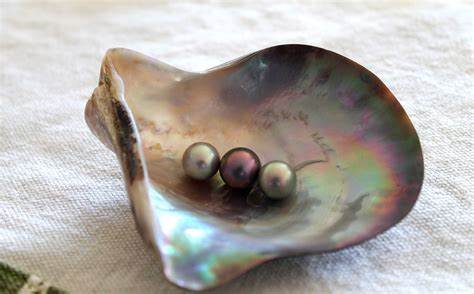In the bottom of each boat are five huge red stones.
在每艘船的船底有五块巨大的红色石头,
Through a hole in each a rope has been passed.
这些石头上面的孔里穿着一根绳子。
Each diver plants his right foot firmly on one of these stones, while with his right hand he grasps a rope;
每一个潜入海底的采珠人把右脚牢牢地用绳子绑在其中一块石头上,然后用右手抓住绳子,
and weighted by the huge red stone, he speedily sinks to the bottom.
因为有红色巨石的重量做辅助,他能够很快地潜入海底。
To hold the shells, he bears with him a basket, or he hangs a net-work bag around his neck.
他带着一个竹筐,或是在脖子上系一张网来装从海底捡到的贝壳。
As soon as he reaches the bottom —and not daring to glance around, lest the monster he dreads may be near—he quickly gathers all the shells within his reach.
当到达海底时,他不敢四处张望,害怕那些海底的猛兽就在附近,所以采珠人竭尽所能快速地收集自己能捡到的贝壳。

Generally speaking, in about two minutes he pulls the rope, which his right hand has never let go, and is swiftly drawn up again into the boat.
大概两分钟之后,他用力一拉右手缠着的那根绳子,就被拽回到船上了。
Each diver makes from forty to fifty plunges in a day, bringing up perhaps a hundred shells at a time.
每个采珠人每天要这样上上下下进行四十到五十次的作业,每次大约可以带上船一百个贝壳。
But remaining under water for one minute—two, four, five minutes—has a terrible effect on the human frame.
但是,待在水底,哪怕一两分钟,或者四五分钟,都会对人体产生很严重的影响。
When the divers come up, not only water, but sometimes blood, pours from their nostrils, mouths, and ears!
当采珠人从深海被拉上船后,从他们的鼻孔、嘴里和耳朵里流出来的不仅是水,有时还有血!
But of this they take no heed. In the blue waters themselves as the only enemy they dread—the fierce and cruel ground-shark.
但他们对此毫不在意。在蓝色的海水里,最让他们感到恐惧的是——凶猛残忍的大清鲨。
When noontide arrives, again the gun fires, and, with colours flying, the boats return, bearing their treasures to the shore.
当正午到来时,又会有枪响声,那些采珠船会带着他们采到的珍宝满载而归。



